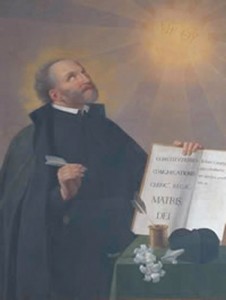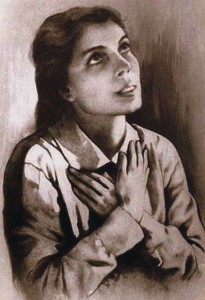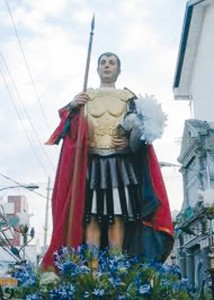October Saints
Saint John Leonardi (1541-1609)
Feastday 9th October
St. John Leonardi was born in Tuscany, Italy in 1541, during the time of upheaval in the Church due to Martin Luther. He studied to be a pharmacist, then became a priest. As a young priest he devoted himself to teaching catechism to youths.
In 1574, he founded the Order of the Clerks Regular of the Mother of God of Lucca, a congregation of diocesan priests. He suffered many tribulations for this work, including exile. His contemporary, St. Philip Neri, was a great friend and spiritual guide, and helped him particularly in his time of exile.
Gradually his influence as a champion of the Catholic faith against Protestantism became known throughout Italy. He later founded in Rome what became the Institute De Propaganda Fide (Society for the Propagation of the Faith) and the Confraternity of Christian Doctrine for the promotion of the Catholic Faith and the formation of missionaries. St. John Leonardi died at Rome, in 1609, the victim of his devoted care for the sick and plague-stricken.
Saint John, help us to see Jesus in those who are sick and in need of our help.
www.freerepublic.com/fpcus/f-religion/1240573/posts)
Blessed Alexandrina Maria da Costa (1904 –1955)
Feastday 13th October
Blessed Alexandrina Maria da Costa was born in Balasar, Portugal, in 1904. Shortly after her birth, her father died, but she received a solid Christian education from her mother. Full of wit and laughter, she became something of a tomboy. Her unusual strength and stamina also enabled her to do long hours of heavy farm work in the fields, thus helping the family income. By the time of her first Holy Communion, though, she had already acquired a deep love of the Blessed Sacrament and was developing a habit of prayer in all circumstances.
At the age of nine, she was sent to work on a farm. When Alexandrina was twelve, she became sick with typhoid and nearly died. The consequences of this infection would remain with her as she grew up and would become the first sign of what God was asking of her: to suffer as a ‘victim soul’. She had to take up sewing for a living.
On Holy Saturday of 1918, while Alexandrina and two other girls were busy sewing, her former employer and two other men violently entered her home and tried to sexually violate them. To preserve her purity, Alexandrina jumped from a window four metres to the ground. Her spine was irreparably injured. Until age 19, the young woman was still able to drag herself to church where, hunched over, she would remain in prayer. Long months of increasing pain and incapacity ended in total paralysis and from 1924 she was bedridden.
Alexandrina continued to ask the Blessed Virgin for the grace of a miraculous healing, promising to become a missionary if she were healed. Little by little, however, God helped her to see that suffering was her vocation. The more Alexandrina understood that this was her mission, the more willingly she embraced it. Those who visited Alexandrina always found a woman who, although in apparent physical discomfort, was always outwardly joyful and smiling, transmitting to all a profound peace.
Her whole life became centred on the Eucharist and, from 1938, every Friday she lived Jesus’ passion. Her constant message was, “do not offend Jesus any more.” From 1942 till her death in 1955, her only food was the Eucharist, though she retained her weight, her vital signs were normal, and her mind was clear and lucid.
Blessed Alexandrina, give us a deep love of the Eucharist.
(Source: www.vatican.va/news_services/liturgy/saints/...)
Saint Longinus
Feastday 22nd October
Longinus of Caesarea is the name given in medieval and some modern Christian traditions to the Roman soldier who pierced Jesus in his side with a lance, the “Holy Lance” while he was on the Cross and who testified, “In truth this man was son of God.” Longinus’ legend grew over the years to the point that he was said to have converted to Christianity after the Crucifixion, and he is traditionally venerated as a saint.
However unreliable the story of the Saint’s life, we can take comfort from the realisation that Jesus comes to us in forms we often do not expect. For a Roman soldier, the last place he would look for a deity would be on a cross in Jerusalem. Hence, his declaration of Jesus’ identity is all the more remarkable because of its source. God’s grace is unexpected, but is also available to the most unlikely people, ourselves included.
Saint Longinus, teach us to recognise and acknowledge Jesus in whatever guise he presents himself to us in our lives.
(Source: www.catholic.org/saints/saint.php?saint_id=11)




 Entries(RSS)
Entries(RSS)